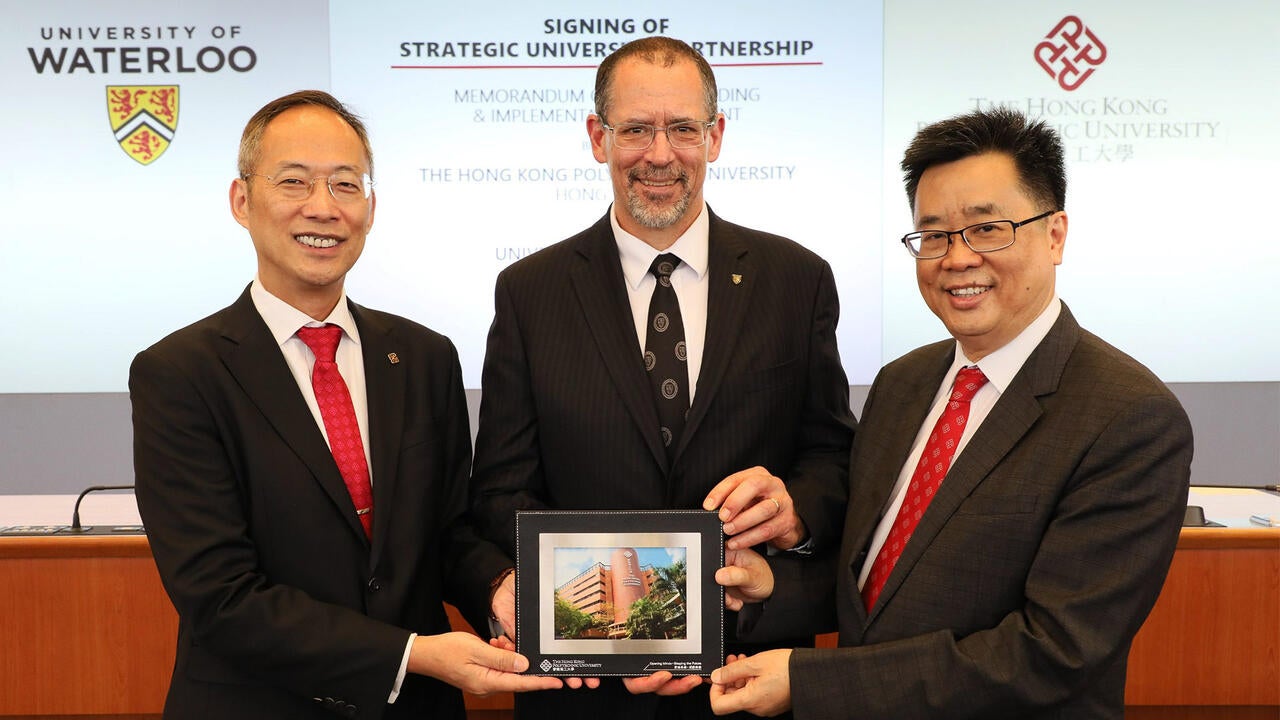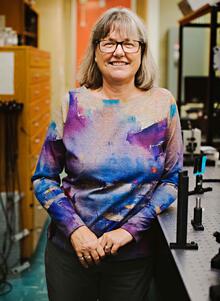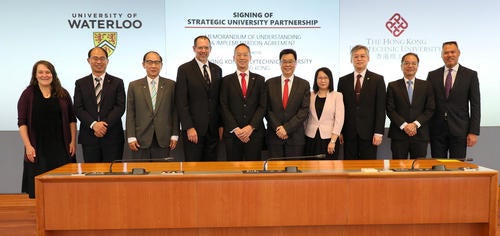
Waterloo signs education agreement with Hong Kong Polytechnic University
Trans-Pacific Institutional Agreement will foster closer partnership in education, research and entrepreneurship.

Trans-Pacific Institutional Agreement will foster closer partnership in education, research and entrepreneurship.
By Marian Gaultney MMG ConsultingThe University of Waterloo has signed a Strategic University Partnership Institutional Agreement with the presidents of the Hong Kong Polytechnic University (PolyU). The historic agreement will allow both universities to foster a closer partnership in education, research and entrepreneurship.

Donna Strickland
The signing marks an important milestone for advancing the initiative of establishing a global Centre for Ocular Research and Development (CORD). The Centre will operate under the umbrella of the Waterloo Biomedical Research and Innovation Node (WBRIN) in Hong Kong, and will include Waterloo Nobel Prize-winner Professor Donna Strickland. Strickland will work with Professor Melanie Campbell on a flagship project to treat age-related macular degeneration, expanding Strickland award-winning work on chirped pulse amplification (CPA) to develop a laser-based two-photon

Professor Bob Lemieux (fourth from left) dean, Faculty of Science; Ir Professor Alexander Wai (fifth from left), vice-president (Research Development), PolyU; Professor David Shum (fifth from right), dean, Faculty of Health and Social Sciences, PolyU; with teams from both universities.
CORD will address vital population health and aging imperatives in Hong Kong by partnering with local and internationally recognized leaders in ocular and vision science, and translating the research to commercial applications. According to the World Health Organization, vision problems cost the global economy US$200 billion annually to lost productivity. The Centre for Myopic Research at PolyU found that 70 per cent of people born between 1950 and 1980 in Hong Kong are nearsighted, or myopic.
“It is exciting to partner with exceptional institutions like PolyU and we cannot wait to expand on an already fruitful relationship through more international exchanges, joint programs, research projects and more,” said Feridun Hamdullahpur, president and vice-chancellor at the University of Waterloo.
The two institutions have broadly agreed on the three possible research areas under CORD, namely aging eye, sight-saving technologies and the eye as a window to the brain. The researchers will explore new approaches in the detection and treatment of eye diseases, study the use of tear fluid as biomarkers to predict and diagnose diseases, and innovate technologies related to myopia prevention and reversal, visual neuro-rehabilitation and nanotechnology-based drug delivery. CORD will also research into early diagnosis and disease monitoring, in particular for diabetes and Alzheimer's disease, through peripheral retinal imaging or optic nerve examination.
Translating research into commercialization will also be a key focus of CORD. The centre aims to bring the University of Waterloo’s entrepreneurial culture to Hong Kong, developing spinoffs and multinationals to commercialize research, and creating a sustainable long-term business model.
The two institutions intend to submit a proposal to the HKSAR Government under the recently announced Health@InnoHK research cluster initiative, with a plan to establish a research node in the Hong Kong Science Park.
Banner image: Professor Bob Lemieux (centre), dean, Faculty of Science, University of Waterloo is presented with a souvenir from Ir Professor Alexander Wai (left), vice-president (Research Development), PolyU, and Professor David Shum (right), dean, Faculty of Health and Social Sciences, PolyU.

Read more
Here are the people and events behind some of this year’s most compelling Waterloo stories

Read more
From co-op to startup: Waterloo students develop an AI platform that uses real-time data for wildfire prediction and early prevention

Read more
More than 20 founders from Waterloo highlight the newly unveiled list that celebrates those making the biggest impact inside Canadian tech and innovation
The University of Waterloo acknowledges that much of our work takes place on the traditional territory of the Neutral, Anishinaabeg, and Haudenosaunee peoples. Our main campus is situated on the Haldimand Tract, the land granted to the Six Nations that includes six miles on each side of the Grand River. Our active work toward reconciliation takes place across our campuses through research, learning, teaching, and community building, and is co-ordinated within the Office of Indigenous Relations.